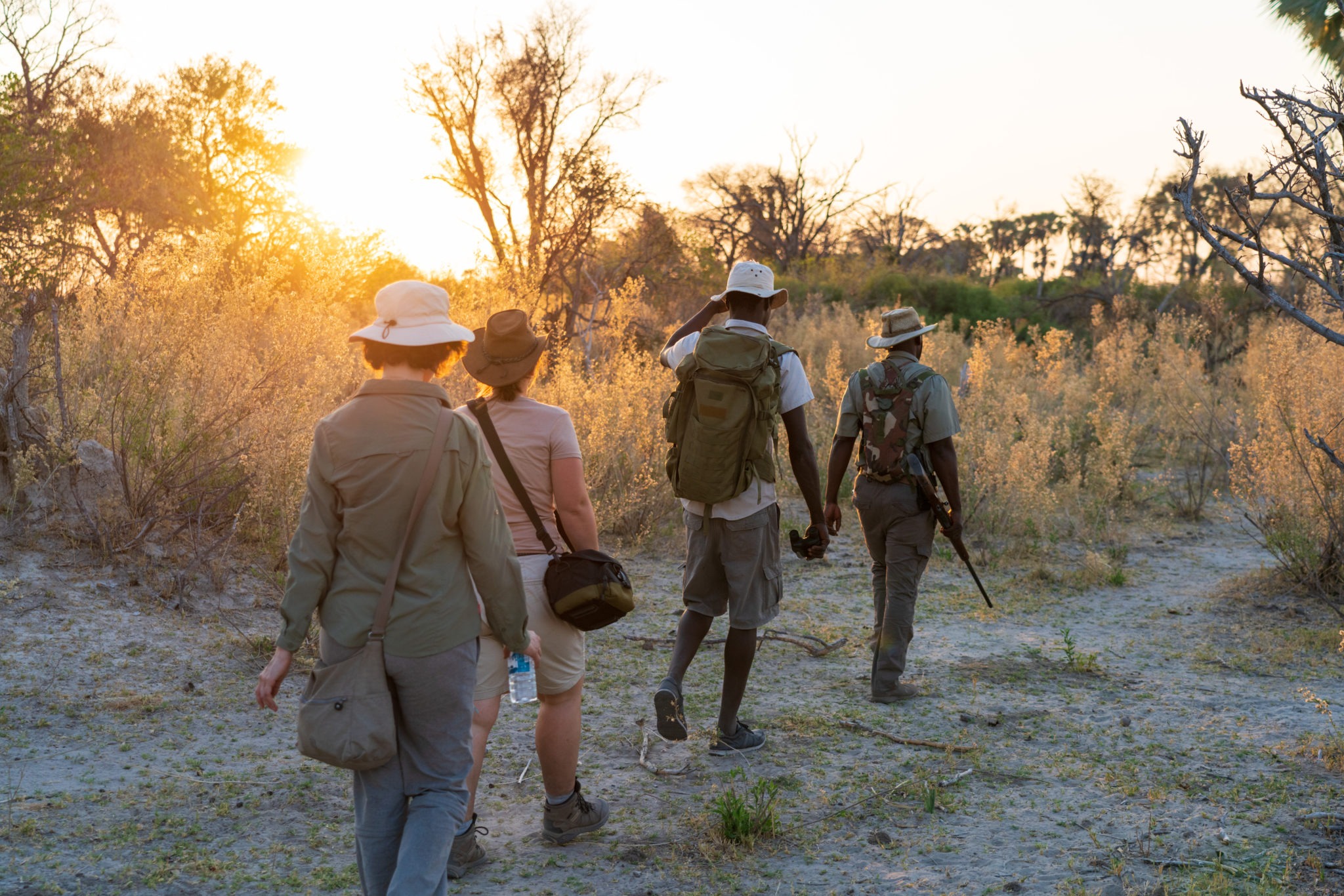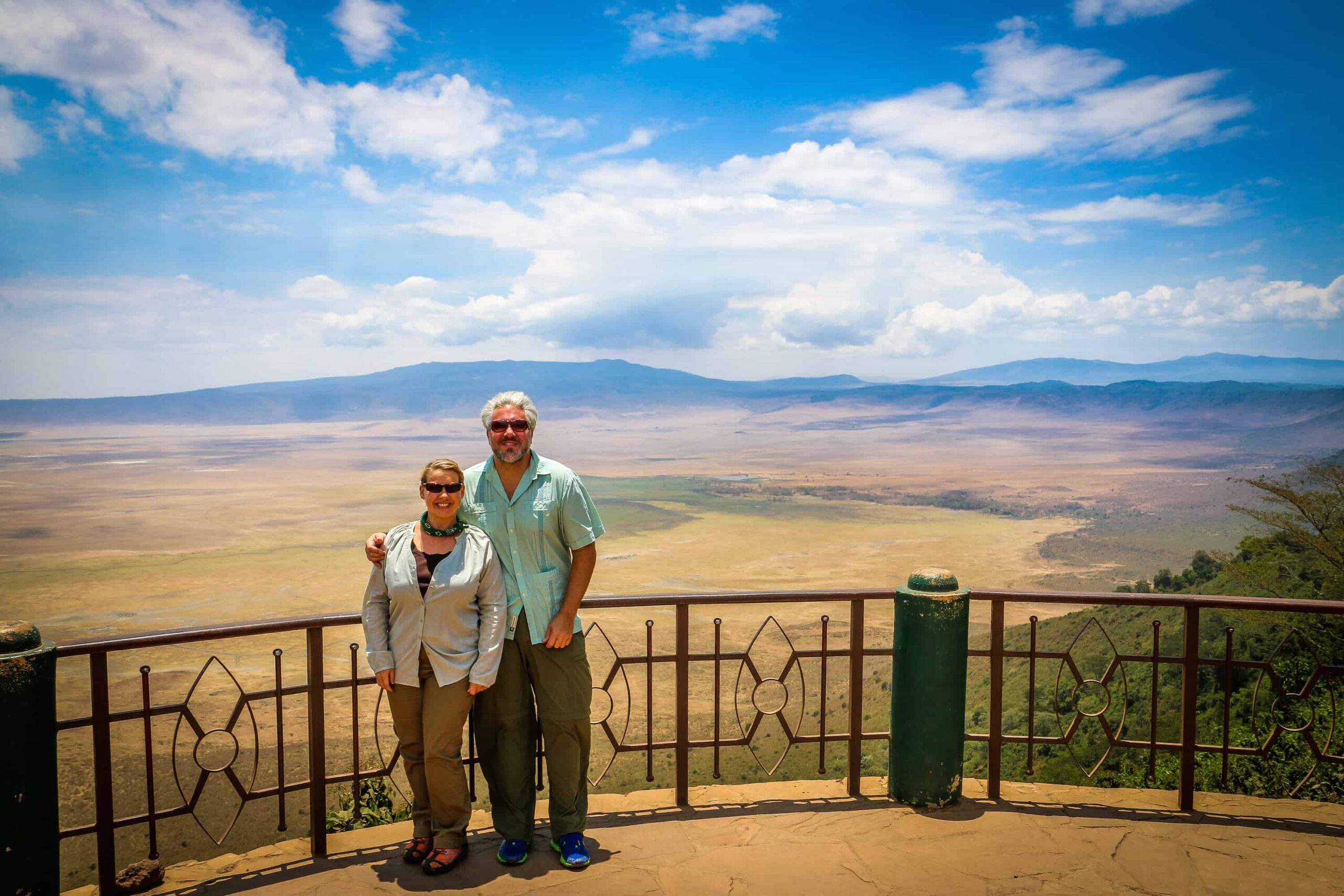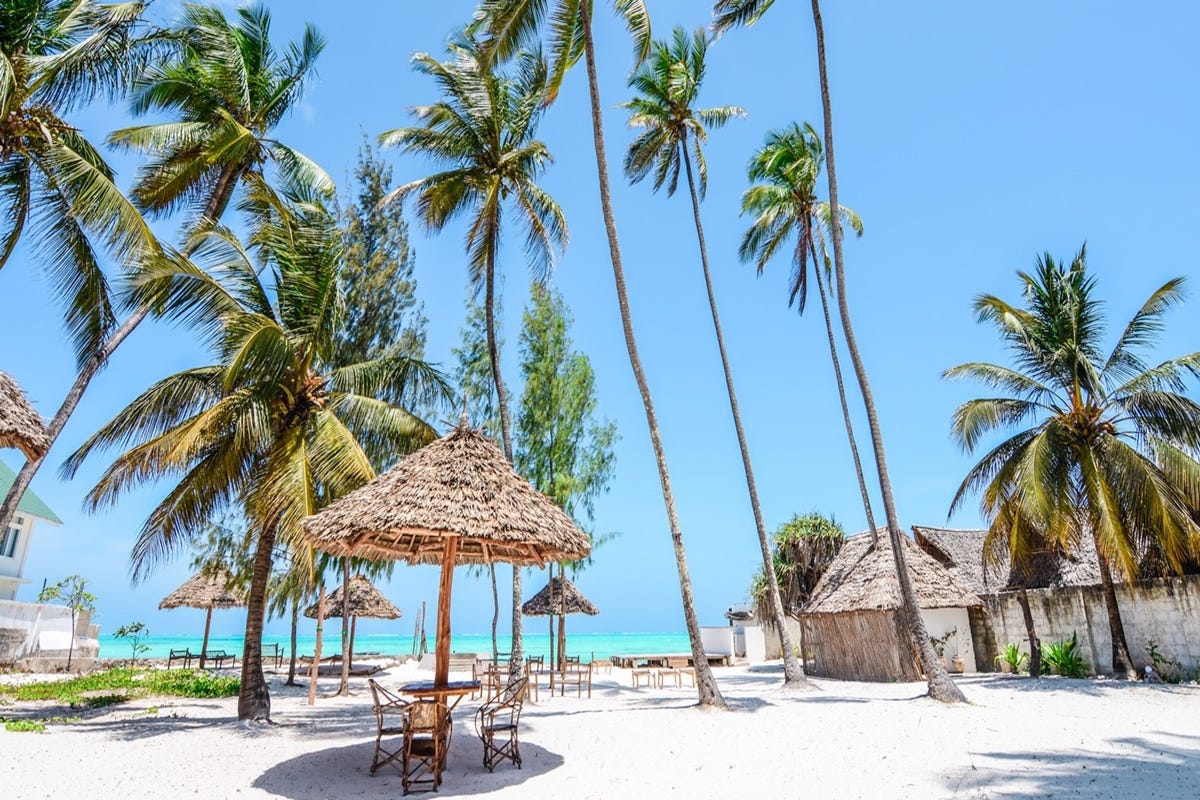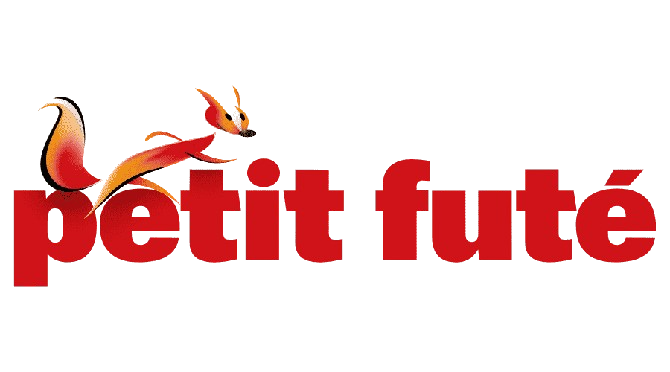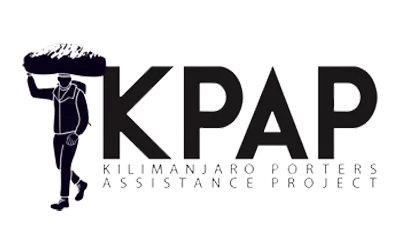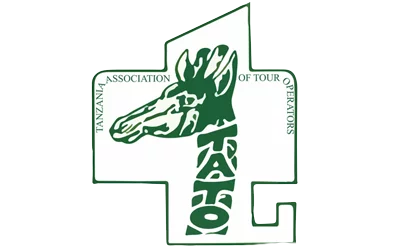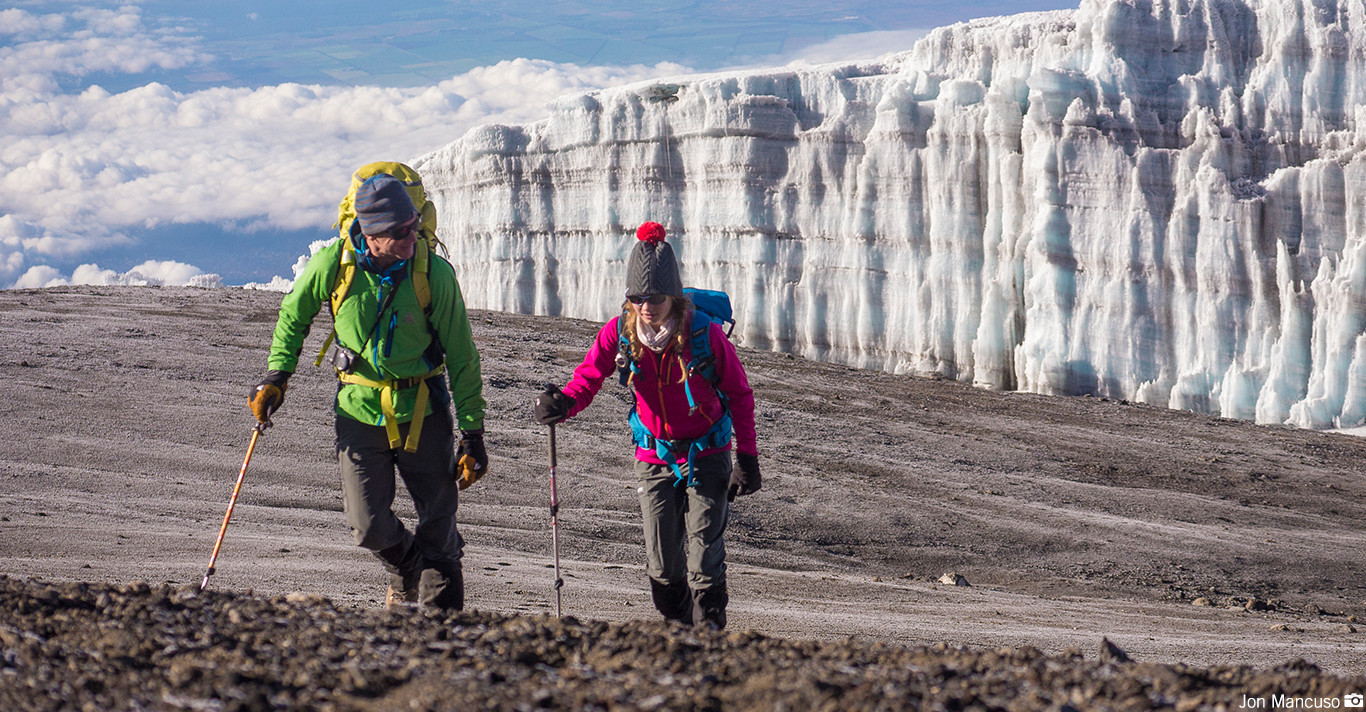
Introduction
Umbwe route is a short, steep and direct route, it’s considered to be difficult and challenging way up Mount Kilimanjaro. Due to the quick ascent, Umbwe does not provide enough altitude acclimatization. Although the traffic on this route is very low, the success summit rates are also low. The route is offered at a minimum of six days, though seven days is recommended when attempting this route. The Umbwe route should only be attempted by experienced hikers and are confident in their ability to acclimatize. However, overall, the Umbwe route is not recommended and we discourage its usage for our clients.
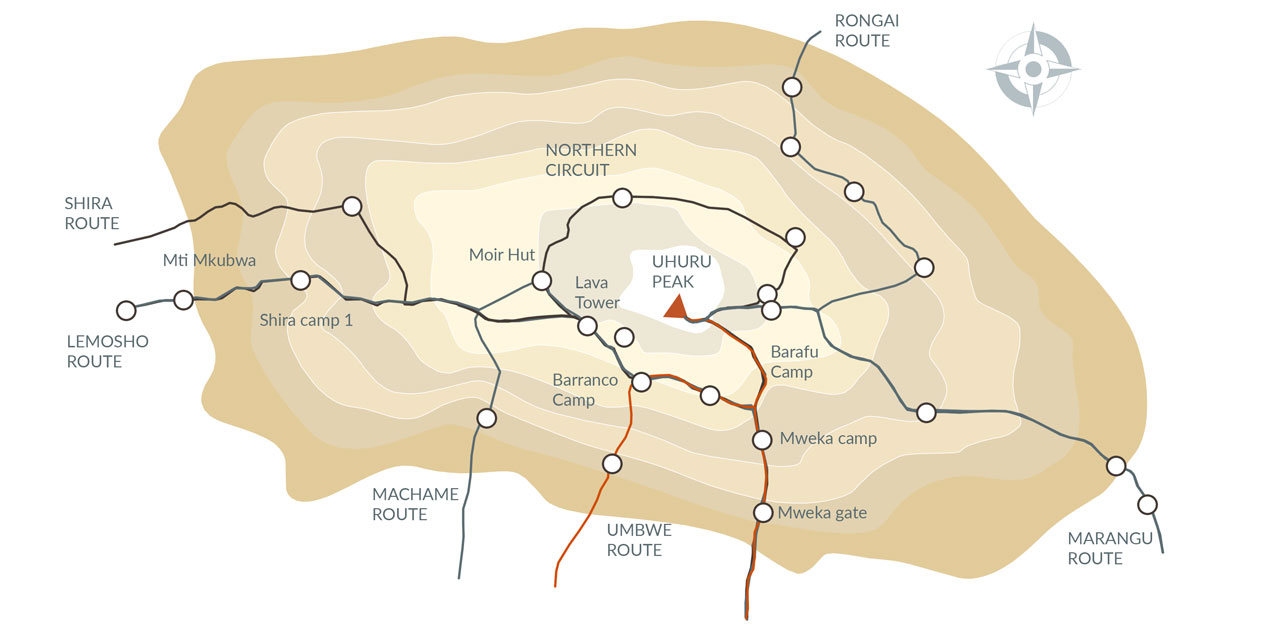
Umbwe Route Kilimanjaro Climbing: An Overview
The Umbwe Route is known for its steep ascent and demanding terrain. This less-traveled route offers a thrilling adventure for trekkers seeking an adrenaline rush.
If you are looking for an adrenaline-pumping adventure, the Umbwe Route is perfect for you. The steep ascent and challenging terrain make it a thrilling experience.
The Unique Appeal of the Umbwe Route
The Umbwe Route is renowned for its solitude and pristine beauty. Trekkers often choose this route for its untouched wilderness and the opportunity to connect with nature.
Planning Your 7 days Umbwe Route Kilimanjaro Climbing
Before embarking on this journey, careful planning is essential. Here’s what you need to know:
- Selecting the Right Tour Operator: Choosing a reputable tour operator like Safari Nuggets with experience in Kilimanjaro expeditions ensures your safety and a smooth journey.
- Acclimatization: Your itinerary should include acclimatization days to help your body adjust to the altitude.
- Gear and Equipment: Packing the right gear and clothing is crucial for your comfort and safety. Make sure you have the essentials, including proper footwear, clothing, and camping equipment.
- Fitness Preparation: Physical fitness is key to a successful climb. Regular cardio and strength training will help you prepare for the trek.
The Adventure Begins: Day by Day Itinerary
Let’s break down your journey day by day:
Day 1: Arrive in Tanzania
You will be picked up at the Kilimanjaro International Airport and transferred to your hotel in Moshi town; you will meet your guide who will brief you on your upcoming trek and do an equipment check to make sure you have all the necessary mountain gear. The missing gear can be rented on this day.
Day 2: Umbwe Gate (1,800m/5,905ft) to Cave Bivouac Camp (2,850m/9,350ft)
At 8am leave Moshi for Umbwe Gate where you will meet our porters, guides, and cooks who will spend the next six days trekking with you to Uhuru Peak, the roof of Africa. After arriving, wait at the gate while we register your climb and the porters and guides make final preparations. Your first day’s destination is Cave Bivouac Camp, approximately 6 hours from the gate. The trail is steep and can be slippery in some places. Hike through the moss-covered trees of Kilimanjaro’s cloud forest. The forest will thin later in the hike and heathers, tall grasses and wildflowers will come into view. Porters and cooks will walk ahead to set up the camp in time for your arrival.
Day 3: Cave Bivouac (2,850m/9,350ft) to Barranco Camp (3,950m/12,960ft)
The first section of the trail continues following the ridge. After leaving the forest, continue through open moorlands until reaching Barranco Camp. Barranco is generally regarded as the most scenic campsite on the Umbwe Trail as it’s surrounded by giant senecios and lobelias. As Barranco is in a valley, the sun rises later than at the other camps.
Day 4: Barranco Camp (3,950m/12,960ft)
Extra Day for Acclimatization. Adding this day will ease your effort, and amplify your acclimatization.
Day 5: Barranco Camp (3,950m/12,960ft) to Karanga Valley (4,200m/13,780ft)
Leave Barranco Camp after breakfast for Karanga Valley. The day begins with a 1.5 hour scramble up the Barranco Wall. This is the hardest part of the day and in some places, you may have to use your hands to aid your climb. After reaching the top, hike through fairly level terrain before making a short but steep descent into the green Karanga River Valley.
Day 6: Karanga Valley (4,200m/13,780ft) to Barafu Camp (4,600m/15,100ft)
After breakfast, begin the hike to Barafu Camp. On the way to Barafu, view several of Kibo’s glaciers as well as the junction that connects the descent route, Mweka, with the Machame trail. During day four, hike by the Heim, Kersten and Decken Glaciers. Although the trail to Barafu passes through alpine desert with little vegetation, Barafu Camp offers stunning views of Kibo and Mawenzi peaks. Try to sleep after finishing dinner as you will wake before midnight for your summit hike.
Day 7: Barafu Camp (4,600m/15,100ft) to Uhuru Peak (5,895m/19,340ft) to Mweka Camp (3,100m/10,170ft)
Around midnight, begin the final ascent to Uhuru Peak. Hike by the light of your headlamp for the next six hours. The ascent to the crater rim is the most challenging part of the entire trek. The trail is very steep until you reach the crater rim at Stella Point.
The hike from Stella Point to Uhuru Peak is a gradual climb and, as far as hikes go, not very difficult. The altitude, however, makes the hike long and tiring. The crater rim hike takes approximately one hour. Upon reaching Uhuru, take photos of your guide and group at the peak before beginning the descent to Mweka Camp. On the way down from Uhuru, enjoy views of the mountain, crater, clouds and glaciers.
At Barafu Camp, eat breakfast and take a short break. You still have another three to five hours to go before reaching Mweka Camp.
Day 8: Mweka Camp (3,100m/10,170ft) to Mweka Gate (1,500m/4,920ft)
After breakfast, finish the trek with a hike through the forest to Mweka Gate. The trail may be slippery following rain. Our vehicles will meet you at the lower station of Mweka Gate to take you back to Moshi.
Day 9: Depart Tanzania
After a good night’s rest at your hotel, you will take breakfast ready for the scheduled check-out by 10.00hrs.(If you wish to remain in the hotel during the day, please advise us of this when you book your trip and we will inform you of the cost for a ‘day room’ which allows you to stay until 18:00hrs, and then make the booking on your behalf.)
As the transfer services have been already included in this package, you will be collected from your hotel and dropped off at the airport.
*Safari, Zanzibar and other add-ons are available if you wish to continue exploring Tanzania
When planning your Kilimanjaro expedition, it is essential to establish a clear budget in advance and take into account additional expenses such as tips for guides and concierge staff.
Safari Nuggets is a reputable local tour operator that helps you plan a safe and successful climb with a successful summit rate of over 95%.
What is the price for Kilimanjaro Climbing on 7 Day Umbwe Route?
Below is a 2024 price list for the Kilimanjaro 7 Day Umbwe route against the group size of climbers. Look for your expected group size and the price, then make a booking for your upcoming adventure with Safari Nuggets.
|
7 Days Umbwe route Prices Per Person |
|
|
Number of Climbers |
Cost per Climber |
|
1 |
$2815 |
|
2 |
$2328 |
|
3 |
$2249 |
|
4 |
$2168 |
|
5 |
$2128 |
|
6 |
$2113 |
|
7 |
$2104 |
|
8 |
$2110 |
|
9 |
$2102 |
|
10+ |
$2087 |
The Trekking Package Price Includes:
- Airport pick up and drop off – Kilimanjaro Airport (JRO) – Moshi
- 2 Hotel nights accommodation in Moshi (one night before the trek and the night after the trek)
- All park fees for the national park including taxes
- All meals and unlimited drinking water while on the mountain
- Private toilet tent included (1 toilet for every 7 climbers)
- All salaries for guides, assistant guides, chef, porters
- Transport to and from the park gate
- Oxygen for altitude sickness emergencies
- All camping equipment (tents, tables, chairs, cooking equipment, dining tent, sleeping mattress — but not sleeping bag)
The Trekking Package Price Excludes:
- Extra JRO airport pickups and drop offs ($40 per car)
- Sleeping bag – please bring your own or rent one from our equipment rental shop
- International flights & visas
- Travel Insurance
- Mountain climb staff tips
- Alcoholic drinks
- Personal travel and baggage
- Telephone/internet bill
- Laundry service
- Any personal items
- Activities not mentioned in the program
Note: For private groups with an even number of participants, the price is based on double occupancy in the hotel in Moshi and in the tents on the mountain. Private rooms/tents are available at an added price. For odd numbered participants, the price for one single hotel room and tent is already factored into the quoted price. Our default policy is to divide the entire price evenly. If you prefer, we can calculate a separate price for those with double occupancy and the person with single occupancy.
Booking Your Kilimanjaro Climb
You can book your 2024 Kilimanjaro climb by filling this form and submit your request. Our tour consultant will get back to you shortly with a quote proposal for your climb. Also see what other customers say about Safari Nuggets on TripAdvisor. Read our Kilimanjaro FAQs and Kilimanjaro Packing List.
FAQs
Q: How difficult is the Umbwe Route?
A: The Umbwe Route is one of the most challenging routes on Kilimanjaro. It involves steep ascents and demanding terrain, requiring a high level of fitness and determination.
Q: What is the best time to climb Kilimanjaro via the Umbwe Route?
A: The best time for the Umbwe Route is during the dry season, from late June to October and from December to February. These periods offer the best weather conditions for a successful climb.
Q: Is it necessary to hire a guide for the Umbwe Route?
A: Yes, hiring a guide is mandatory for the Umbwe Route. Experienced guides are essential for your safety and navigation through the challenging terrain.
Q: What should I pack for the 6 days Umbwe Route climb?
A: You should pack essentials like warm clothing, rain gear, a good quality sleeping bag, comfortable hiking boots, and trekking poles. Your tour operator will provide you with a comprehensive packing list.
Q: How can I prepare for the altitude on the Umbwe Route?
A: Adequate acclimatization is essential. You should consider spending an extra day at Karanga Camp to help your body adjust to the altitude. Hydration and a slow ascent are also key.
Q: Is it possible to see wildlife on the Umbwe Route?
A: While Kilimanjaro is not primarily a wildlife destination, you may encounter some wildlife in the lower rainforest sections, including monkeys and various bird species.

